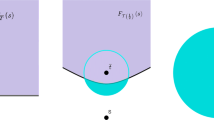Abstract
The existence of a feasible solution to a system of infinite-dimensional linear inequalities is characterized by a topological generalization of the Farkas Condition. If this result is specialized to a finite-dimensional vector space with finite positive cone, then a geometric proof of the classic Minkowski-Farkas Lemma is obtained. A dual version leads to an infinite-dimensional extension of the Theorem of the Alternative.
Similar content being viewed by others
References
E.J. Anderson, P. Nash, Linear Programming in Infinite-Dimensional Spaces, John Wiley & Sons: New York (1987).
A. Ben-Israel, A. Charnes, On the intersection of cones and subspaces, Bull. Amer. Math. Soc., 74 (1968), 541–544.
A. Ben-Israel, Linear equations and inequalities on finite-dimensional real or complex vector spaces: a unified theory, J. Math. Anal. Appl., 27 (1969), 376–389
A. Ben-Israel, A. Charnes, K.O. Kortanek, Asymptotic duality over closed convex sets, J. Math. Anal. Appl., 35 (1971), 677–691.
J. Borwein, Multivalued approach to the Farkas lemma, Math. Prog. Study, 10 (1979), 42–47.
C.C. Braunschweiger, H.E. Clark, An extension of the Farkas theorem, The American Math. Monthly, 69(4) (1962), 272–277.
C.G. Broyden, A simple algebraic proof of Farkas's lemma and related theorems, Optim. Method Softw. 8(3–4) (1998), 185–189.
A. Charnes, W.W. Cooper, K. Kortanek,Duality in semi-infinite programs and some works of Haar and Caratheodory, Management Sci., 9(2) (1963), 209–228.
S.A. Clark, The valuation problem in arbitrage price theory, J. Math. Econom. 22 (1993), 463–478.
S.A. Clark, The random utility model with an infinite choice space, Econ. Theor., 7 (1996), 179–189.
S.A. Clark, Arbitrage approximation theory, J. Math. Econom., 33 (2000), 167–181.
S.A. Clark, An infinite-dimensional LP duality theorem, Math. Oper. Res., 28(2) (2003), 233–245.
B.D. Craven, J.J. Koliha, Generalizations of Farkas' theorem, SIAM J. Math. Anal. 8 (1977), 983–997.
A. Dax, An elementary proof of Farkas' lemma, SIAM Rev. 39(3) (1997), 503–507.
A. Dax, V.P. Sreedharan, Theorems of the alternative and duality, J. Optim. Theory Appl. 94(3) (1997), 561–590.
B. De Finetti, Foresight: its logical laws, its subjective sources, Ann. Inst. Henri Poincaré 7 [Reprinted In: H.E. Kyberg and H.E. Smokler (eds.), Studies in Subjective Probability, Krieger: Huntington, N.Y., 1964] (1937).
R.J. Duffin, Infinite programs, In: H.W. Kuhn and A.W. Tucker (eds.), Linear Inequalities and Related Systems, Princeton University Press: Princeton, N.J., 1956 pp. 157–170.
K. Fan, On systems of linear inequalities, In: H.W. Kuhn and A.W. Tucker (eds.), Linear Inequalities and Related Systems, Princeton University Press: Princeton, N.J., (1956), pp. 99-156.
K. Fan, On infinite systems of linear inequalities, J. Math. Anal. Appl. 21 (1968), 475–478.
D. Gale, The Theory of Linear Economic Models, McGraw-Hill: New York, 1960
M.A. Goberna, M.A. López, J.A. Mira, J. Valls, On the existence of solutions for linear inequality systems, J. Math. Anal. Appl. 192 (1995), 133–150.
L. Hurwicz, Programming in linear spaces, In: K.J. Arrow, L. Hurwicz, and H. Uzawa (eds.), Studies in Linear and Nonlinear Programming, Stanford University Press: Stanford, California, (1958) 38–102.
V. Jeyakumar, A general Farkas lemma and characterization of optimality for a nonsmooth program involving convex processes, J. Optim. Theory Appl. 55(3) (1987), 449–461.
V. Jeyakumar, B.M. Glover,Nonlinear extensions of Farkas' lemma with applications to global optimization and least squares, Math. Oper. Res. 20(4) (1995), 818–837.
V. Komornik, A simple proof of Farkas' lemma, Am. Math. Mon. 105 (1998), 10, 949-950.
D.H. Krantz, R.D. Luce, P. Suppes, and A. Tversky (1971), Foundations of Measurement, Volume I, Academic Press: New York.
D.M. Kreps (1981), Arbitrage and equilibrium in economies with infinitely many commodities, J. Math. Econom. 8, 15-35.
K.S. Kretschmer, Programmes in paired spaces, Canadian J. Math. 13 (1961), 221–238.
J.B. Lasserre, A Farkas lemma without a standard closure condition, SIAM J. Control Optim. 35(1) (1997), 265–272.
J.B. Lasserre, A theorem of the alternative in Banach lattices, Proceedings of the American Math. Soc. 126(1) (1998), 189–194.
D. McFadden, Econometric models of probabilistic choice, In: C.F. Manski and D. McFadden (eds.), Structural Analysis of Discrete Data with Econometric Applications, MIT Press: Cambridge, Mass., (1981) 198–272.
V.N. Phat, J.Y. Park, Further generalizations of Farkas' theorem and their applications in optimal control, J. Math. Anal. Appl. 216 (1997), 23–39.
R.T. Rockafellar, Convex Analysis, Princeton University Press: Princeton, N.J., 1970
W. Schachermayer, No arbitrage: on the work of David Kreps, Positivity 6(3) (2002), 359–368.
H.H. Schaefer, Topological Vector Spaces, Springer-Verlag: New York 1986
W. Song, A general Farkas type lemma, Integral Transform and Special Functions 4 (1996), 147–152.
V.A. Sposito, H.T. David, A note on Farkas lemmas over cone domains, SIAM J. Appl. Math. 22(3) (1972), 356–358.
C. Zalinescu, A generalization of the Farkas lemma and applications to convex programming, J. Math. Anal. Appl. 66 (1978), 651–678.
Y.J. Zhu, Generalizations of some fundamental theorems on linear inequalities, Acta Math. Sinica 16 (1966), 25–40.
Author information
Authors and Affiliations
Corresponding author
Rights and permissions
About this article
Cite this article
Clark, S. Necessary and Sufficient Conditions for Solving Infinite-Dimensional Linear Inequalities. Positivity 10, 475–489 (2006). https://doi.org/10.1007/s11117-005-0042-x
Received:
Accepted:
Published:
Issue Date:
DOI: https://doi.org/10.1007/s11117-005-0042-x



